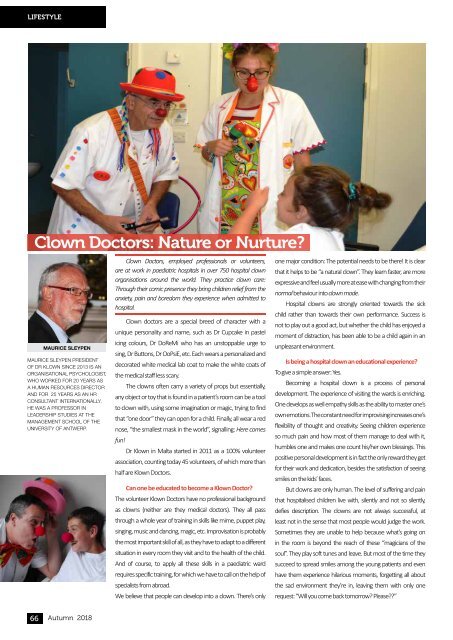THE ACCOUNTANT_AUTUMN_2018_VER-7-L
You also want an ePaper? Increase the reach of your titles
YUMPU automatically turns print PDFs into web optimized ePapers that Google loves.
LIFESTYLE<br />
Clown Doctors: Nature or Nurture?<br />
MAURICE SLEYPEN<br />
MAURICE SLEYPEN PRESIDENT<br />
OF DR KLOWN SINCE 2013 IS AN<br />
ORGANISATIONAL PSYCHOLOGIST,<br />
WHO WORKED FOR 20 YEARS AS<br />
A HUMAN RESOURCES DIRECTOR<br />
AND FOR 25 YEARS AS AN HR<br />
CONSULTANT INTERNATIONALLY.<br />
HE WAS A PROFESSOR IN<br />
LEADERSHIP STUDIES AT <strong>THE</strong><br />
MANAGEMENT SCHOOL OF <strong>THE</strong><br />
UNI<strong>VER</strong>SITY OF ANTWERP.<br />
Clown Doctors, employed professionals or volunteers,<br />
are at work in paediatric hospitals in over 750 hospital clown<br />
organisations around the world. They practice clown care:<br />
Through their comic presence they bring children relief from the<br />
anxiety, pain and boredom they experience when admitted to<br />
hospital.<br />
Clown doctors are a special breed of character with a<br />
unique personality and name, such as Dr Cupcake in pastel<br />
icing colours, Dr DoReMi who has an unstoppable urge to<br />
sing, Dr Buttons, Dr OoPsiE, etc. Each wears a personalized and<br />
decorated white medical lab coat to make the white coats of<br />
the medical staff less scary.<br />
The clowns often carry a variety of props but essentially,<br />
any object or toy that is found in a patient’s room can be a tool<br />
to clown with, using some imagination or magic, trying to find<br />
that “one door” they can open for a child. Finally, all wear a red<br />
nose, “the smallest mask in the world”, signalling: Here comes<br />
fun!<br />
Dr Klown in Malta started in 2011 as a 100% volunteer<br />
association, counting today 45 volunteers, of which more than<br />
half are Klown Doctors.<br />
Can one be educated to become a Klown Doctor?<br />
The volunteer Klown Doctors have no professional background<br />
as clowns (neither are they medical doctors). They all pass<br />
through a whole year of training in skills like mime, puppet play,<br />
singing, music and dancing, magic, etc. Improvisation is probably<br />
the most important skill of all, as they have to adapt to a different<br />
situation in every room they visit and to the health of the child.<br />
And of course, to apply all these skills in a paediatric ward<br />
requires specific training, for which we have to call on the help of<br />
specialists from abroad.<br />
We believe that people can develop into a clown. There’s only<br />
one major condition: The potential needs to be there! It is clear<br />
that it helps to be “a natural clown”. They learn faster, are more<br />
expressive and feel usually more at ease with changing from their<br />
normal behaviour into clown mode.<br />
Hospital clowns are strongly oriented towards the sick<br />
child rather than towards their own performance. Success is<br />
not to play out a good act, but whether the child has enjoyed a<br />
moment of distraction, has been able to be a child again in an<br />
unpleasant environment.<br />
Is being a hospital clown an educational experience?<br />
To give a simple answer: Yes.<br />
Becoming a hospital clown is a process of personal<br />
development. The experience of visiting the wards is enriching.<br />
One develops as well empathy skills as the ability to master one’s<br />
own emotions. The constant need for improvising increases one’s<br />
flexibility of thought and creativity. Seeing children experience<br />
so much pain and how most of them manage to deal with it,<br />
humbles one and makes one count his/her own blessings. This<br />
positive personal development is in fact the only reward they get<br />
for their work and dedication, besides the satisfaction of seeing<br />
smiles on the kids’ faces.<br />
But clowns are only human. The level of suffering and pain<br />
that hospitalised children live with, silently and not so silently,<br />
defies description. The clowns are not always successful, at<br />
least not in the sense that most people would judge the work.<br />
Sometimes they are unable to help because what’s going on<br />
in the room is beyond the reach of these “magicians of the<br />
soul”. They play soft tunes and leave. But most of the time they<br />
succeed to spread smiles among the young patients and even<br />
have them experience hilarious moments, forgetting all about<br />
the sad environment they’re in, leaving them with only one<br />
request: “Will you come back tomorrow? Please??”<br />
66 Autumn <strong>2018</strong>
















